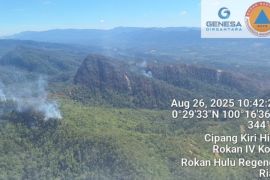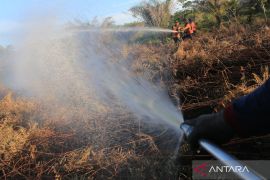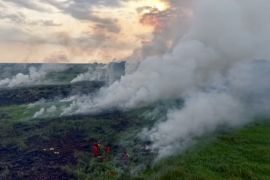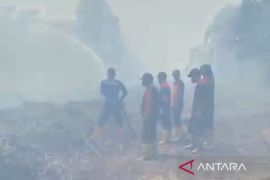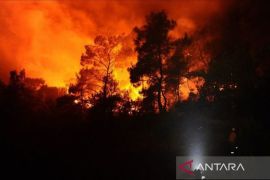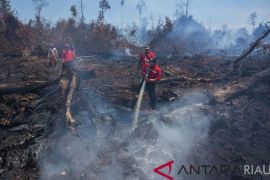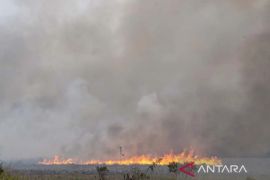Indonesia remained haze-free in 2016, after two decades of experiencing annual forest fires that had triggered haze, Environmental Affairs and Forestry Minister Siti Nurbaya has confirmed.
"For the first time, in 2016, we did not experience major forest fires thanks to the joint hard work of many in the regions. The number of hotspots decreased by 80 to 92 percent, according to the NOAA and Terra satellite methods," the minister said on Dec 10, 2016.
The number of hotspots, from January 1 to December 9, 2016, reached 3,844, a significant drop from 21,847 during the same period in the previous year.
In Riau, the Sumatran province worst hit by haze, there were 1,924 hotspots last year, and this year, there are only 371. In Central Kalimantan, the number of hotspots dropped from 4,283 last year, to 257 this year.
Based on data from the TERRA and AQUA Satellites from NASA, during this same period the number of hotspots significantly decreased from 70,252 last year, to 3,814 this year.
The minister expressed her appreciation to all members of the forest fire teams who have done their best in the field to prevent or extinguish forest and plantation fires. The teams were made up of military and police personnel, regional administration officers, and local inhabitants.
"They worked, regardless of holidays, and even stayed overnight at the locations to prevent fires from spreading to larger areas," she noted. They also worked on land, as well as from the air, to put out fires.
To prevent forest fires from spreading, there have been daily patrols, deployment of 23 helicopters, water bombs totaling some 92 million liters of water, artificial rains, and more strict legal enforcement, including sanctions and imprisonment. Additionally, companies involved in setting forest fires might lose their business licenses, she warned.
In order to optimize the fight against fires, the provinces of Riau, South Sumatra, West Kalimantan, Central Kalimantan, Jambi and South Kalimantan have declared a forest fire emergency status.
The integrated team, that also conducted routine patrols, comprises Manggala Agni, rangers, the Indonesian Defense Forces (TNI), the Indonesian Police (POLRI), the press, NGOs, and local authorities, as well as communities.
"We are grateful that this year we could handle forest fires, and the public did not suffer from haze, as in previous years. We kept on optimally decreasing the number of hotspots that could produce haze," she added.
The government has set up an integrated forest fire control mechanism, and a preventive and early detection mechanism to curb forest fires.
The mechanisms include building 18,507 water management containers, establishing 347 out of the target of 731 integrated patrol villages, and setting up a task force that operate a mitigation and reporting system.
"I have also opened an information gateway. My personal cellphone is on 24 hours a day, seven days a week. I have also received reports on forest fires on social media from various community groups and teams in the fields. Every report has been read, and made as an objective reference for follow up measures, and coordinates with cross sectoral, cross ministerial and other concerned parties," Nurbaya said.
Also, legal enforcement has been stepped up to prevent fires intentionally set, particularly in farmland and plantation areas.
In line with Law No. 32 Year 2009 on Environmental Protection and Management, forest and plantation arsonists could face up to 15 years in jail and a maximum fine of Rp15 billion if a fire claims casualties.
The National Police Criminal Investigation Department (Bareskrim) has detained at least 85 forest fire suspects in Riau, up through August this year.
"In addition, nine companies are being investigated for alleged involvement in forest fires," said Bareskrim chief Insp. Gen. Ari Dono Sukmanto on Aug. 25.
In West Kalimantan, the Military District Command (Kodim) 1207/BS Pontianak has detained 38 people, including 26 farmers, suspected of setting fires.
"Of the 38 suspects, 36 are farmers who clear their farm lands by setting fire to them, and one suspect cleared land the same way for housing construction," Commander of Kodim 1207/BS Pontianak, Colonel (Inf) Jacky Ariestanto said. Another suspect cleared land by using fire for a palm oil plantation, he added.
Earlier, the National Disaster Management Agency (BNPB) announced that six Indonesian provinces - Riau, Jambi, South Sumatra, West Kalimantan, Central Kalimantan and South Kalimantan, are in a state of emergency due to forest and bush fires.
BNPB has put operating eight water bombing helicopters to help extinguish the fires, spokesman of the agency Sutopo Purwo Nugroho said on Aug. 23.
Spread over 17,000 islands, Indonesia is home to the world's third largest area of rainforests, after the Amazon and Africas Congo Basin.
Forest and plantation fires, which ravaged Indonesia in 2015, inflicted material losses of trillions of rupiah, in addition to the operational costs involved in extinguishing the fires.
In addition, the hazardous haze emanating from forest and plantation fires led to 10 deaths, left 503,000 people sick and 43 million people exposed to smoke, in six provinces in Sumatra and Kalimantan during the previous year. They reportedly suffered from acute respiratory infection, eye and skin irritations, as well as pneumonia. (*)
Reporter: Fardah
Editor: Heru Purwanto
Copyright © ANTARA 2016

